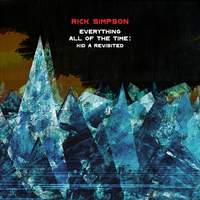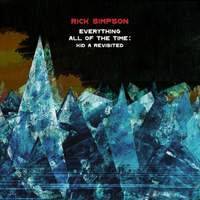Recording of the Week,
Rick Simpson - Everything All of the Time: Kid A Revisited
 The original Kid A came at an interesting time, in hindsight, for British band Radiohead’s career. Following up the wildly successful alternative rock hit OK Computer (1997), Thom Yorke, the creative head of the band, wanted to diverge very deliberately from the rock-centric approach of their past work. The band’s fourth album features mainly electronic beats and synthesisers with only a handful of guitar, with many tracks featuring vague lyrics, strange melodies and ambient soundscapes. A far cry from the more radio-friendly hits from past albums OK Computer or The Bends, Kid A was met with a rather polarising reception, with both fans and critics unsure what to make of it. Of course, two decades later it has deservedly attained a ‘classic’ status, and so it’s fitting that in the year its twentieth anniversary pianist Rick Simpson’s tribute lands. Simpson is a London-based pianist, Yamaha Scholarship-winner, and (in better times) a regular player around various London venues.
The original Kid A came at an interesting time, in hindsight, for British band Radiohead’s career. Following up the wildly successful alternative rock hit OK Computer (1997), Thom Yorke, the creative head of the band, wanted to diverge very deliberately from the rock-centric approach of their past work. The band’s fourth album features mainly electronic beats and synthesisers with only a handful of guitar, with many tracks featuring vague lyrics, strange melodies and ambient soundscapes. A far cry from the more radio-friendly hits from past albums OK Computer or The Bends, Kid A was met with a rather polarising reception, with both fans and critics unsure what to make of it. Of course, two decades later it has deservedly attained a ‘classic’ status, and so it’s fitting that in the year its twentieth anniversary pianist Rick Simpson’s tribute lands. Simpson is a London-based pianist, Yamaha Scholarship-winner, and (in better times) a regular player around various London venues.
The Kid A Revisited project itself was the product of several sell-out shows curated by Simpson himself at the Vortex Club, where non-jazz albums were reinterpreted for a live audience with an emphasis on improvisation. With the success of these shows, Simpson assembled a studio line-up to capture the Kid A session on record; two saxophonists Tori Freestone and James Allsop, while the rhythmic duties are handled by bassist Dave Whitford and drummer Will Glaser. Freestone is a fellow Whirlwind labelmate of Simpson’s, with much of her work in the UK scene largely improvisational in both sidewoman and bandleading roles; Freestone and Allsop’s twin saxophone melodies play off each other and synchronise, resulting on some of the most energising moments on the record. Picking Whitford for bass duties makes sense for Simpson, as the prolific bassist also makes regular appearances at the same London clubs the pianist frequents; prior to recent events, both played at spots like Ronnie Scott’s and The 606. Glaser, meanwhile, is something of a new face, and recently put out an improvised duet album with Allsop following the easing of lockdown restrictions.
Simpson and co. don’t simply take Radiohead’s original songs, transcribe them to a piano trio and add a swing tempo. Some of the original songs are taken so far beyond their original form that you’d be hard-pressed to name the song if it wasn’t printed on the tracklist. Certain tracks like the opener ‘Everything In Its Right Place’ are more obvious, with the distinctive synthesiser melody played on a piano, but the ambient track ‘Treefingers’ is now a sparse and airy jam, while ‘Idioteque’ is mostly indistinguishable from its original form, although retaining the original’s unsettling and direct sound. True to the spirit of the improvisatory sessions that sparked the project, Simpson and co.’s take on the krautrock-inspired ‘The National Anthem’ becomes a setup for some aggressive improvisation, reminiscent of the organised chaos of the original, featuring the boisterous, brassy melodies originally played by the band’s in-studio big band. The title track works rather well - starting out as a wintery ballad, kicking up a little in its latter half, some especially sharp duelling melodies from the dual saxophones.
Simpson and his ensemble make a great go at playing through these already fairly abstract and unconventional songs. Keeping the tradition of jazz musicians reinterpreting popular songs of the day, albeit a record from twenty years ago, hearing a piano-led group covering Radiohead is perhaps not the strangest thing. It’s something that Brad Mehldau made a whole series of with his Art of the Trio project covering various songs from an all-manner of sources, including Radiohead’s ‘Exit Music (For a Film)’ and ‘Paranoid Android’ from OK Computer. The more left-field nature of this original record lends itself nicely to the more outgoing improvisatory tendencies of its players, in a way that’s likely to delight both fans of eccentric jazz and curious Radiohead fans alike.
Available Formats: CD, MP3, FLAC
Available Format: Vinyl Record




